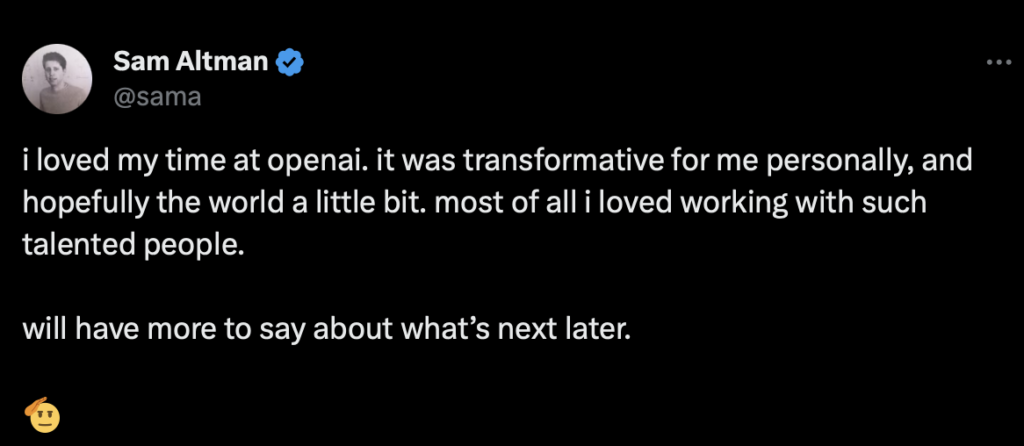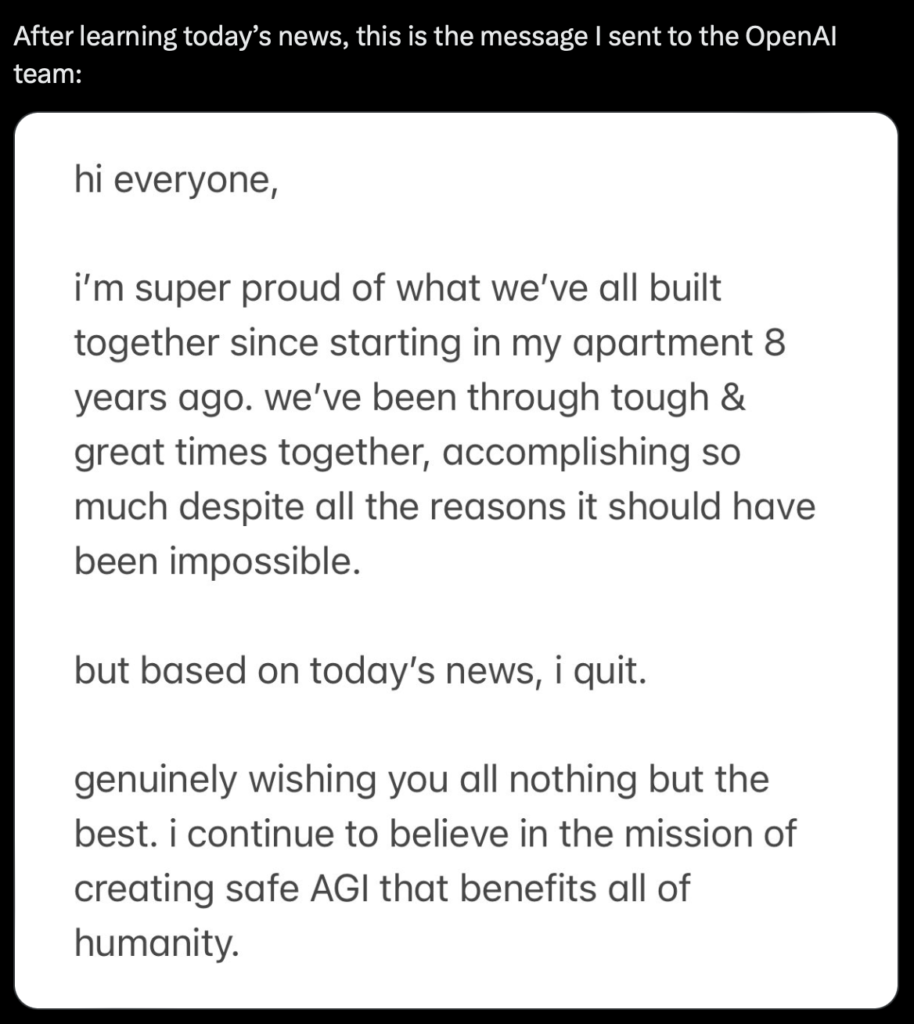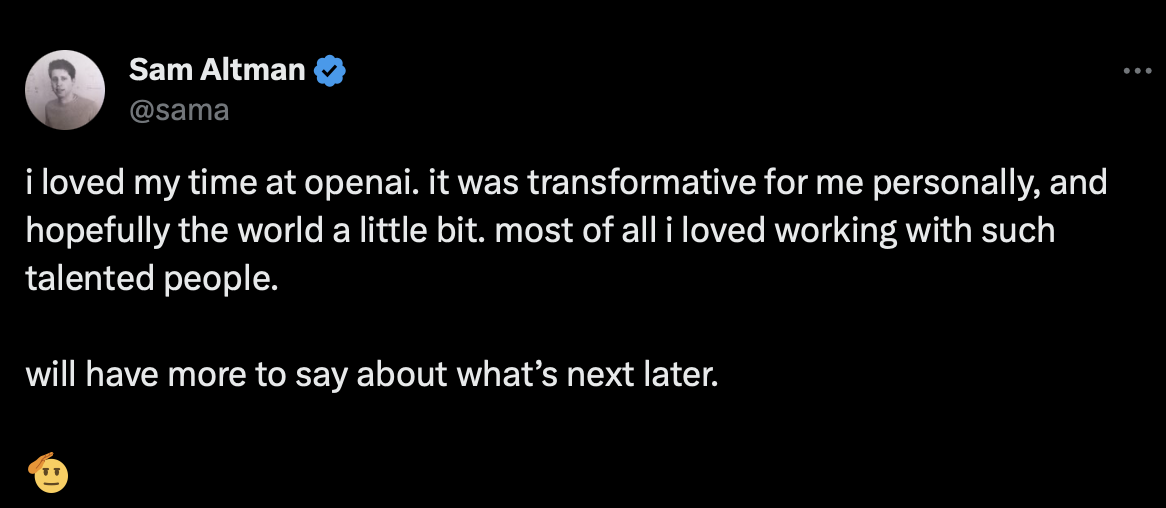Introduction
In a major development, Sam Altman, who played a pivotal role in OpenAI founding and growth, will exit as CEO, and Mira Murati, the Chief Technology Officer, has been appointed as the interim CEO.
In 2015, Sam Altman co-founded a nonprofit artificial intelligence research company that has subsequently received billions of dollars in funding from Microsoft. This financial support comes at a time of heightened interest in ChatGPT, a chatbot driven by a robust language model.
ChatGPT, a product from OpenAI has grown rapidly since its launch in November 2022, reaching over 1 million registered users in less than a week. This is a testament to the popularity of the chatbot and its ability to generate human-quality text.
This news comes after a deliberative review process by the board of directors, citing concerns about communication transparency. This blog post delves into the details of this transition and what it means for the future of OpenAI.

Join Our WhatsApp News for updated information on semiconductors & AI
Reasons Behind Sam Altman Exit OpenAI
The decision for Sam Altman to depart as CEO stems from a careful review process by the board. Concerns were raised about the consistency and transparency of communication, hindering the board’s ability to fulfill its responsibilities.
The board expressed that this move is essential to maintain the company’s commitment to its mission and values.
“…he was not consistently candid in his communications with the board, hindering its ability to exercise its responsibilities. The board no longer has confidence in his ability to continue leading OpenAI.”
~Open AI Official Media Release

Read More: Explained: What the hell is ChatGPT
4 Potential Reasons for Sam Altman exit from OpenAI
Sam Altman’s departure from OpenAI and ChatGPT could be attributed to a combination of factors, including:
Concerns raised by Internal engineers
The concerns raised by engineers regarding the lack of adequate safety reviews in capitalizing on the ChatGPT wave are indeed valid and warrant careful consideration. As the demand for advanced language models like ChatGPT continues to surge, the ethical responsibility to prioritize safety measures becomes increasingly crucial.
Sam Altman’s recent proposal for the GPT store, following the trend of capitalizing on the success of ChatGPT, has raised eyebrows within the engineering community. The notion of a GPT store introduces a new dimension to the conversation, emphasizing the need for thorough safety reviews before venturing into uncharted territories.
Difficulties managing rapid growth:
ChatGPT’s meteoric rise in popularity presented significant challenges for OpenAI,. This is particularly in terms of scaling infrastructure and addressing potential misuse of the technology.
Altman may have faced pressure from the board or investors to address these issues more effectively.
Diversifying interests:
Altman has a history of involvement in multiple ventures, and his departure from OpenAI could be part of a broader strategy to pursue other opportunities.
He may have felt that stepping away from OpenAI would allow him to dedicate more attention to other projects.
Frankenstein moment:
The discord between Altman’s ethical considerations and OpenAI’s profit-driven strategy has sparked speculation regarding his position within the company. Some onlookers propose that Altman might be going through a “Frankenstein moment,”. He has been expressing potential regret for his part in developing a technology with unforeseen and widespread implications.
This internal conflict introduces additional complexity to OpenAI’s strategic trajectory, contributing an extra layer of uncertainty to the organization’s future.
Read More: Altman’s Frankenstein Moment: The End of ChatGPT?
OpenAI’s Ongoing Mission
Founded in 2015 as a non-profit, OpenAI underwent restructuring in 2019 to balance its mission with the need to raise capital. The board, mainly composed of independent directors, lacks equity in the company. The board includes OpenAI Chief Scientist Ilya Sutskever and independent directors such as Quora CEO Adam D’Angelo, technology entrepreneur Tasha McCauley, and Helen Toner from the Georgetown Center for Security and Emerging Technology.
OpenAI remains dedicated to advancing its mission and preserving the principles outlined in its Charter.
Read More: How a Google Research Paper gave birth to its Rival, ChatGPT
The Search for a Permanent CEO
As Mira Murati assumes the role of interim CEO, the board actively conducts a formal search for a permanent successor. This process ensures that OpenAI continues its trajectory as a leader in the AI space with a strong and visionary leader at the helm.
“OpenAI was deliberately structured to advance our mission: to ensure that artificial general intelligence benefits all humanity. The board remains fully committed to serving this mission. We are grateful for Sam’s many contributions to the founding and growth of OpenAI. At the same time, we believe new leadership is necessary as we move forward. As the leader of the company’s research, product, and safety functions, Mira is exceptionally qualified to step into the role of interim CEO. We have the utmost confidence in her ability to lead OpenAI during this transition period.”
~Open AI Official Media Release
Read more: ChatGPT Beats Humans in Chip Design Contest!
Other co-founder Greg Bockman also leaves ChatGPT.

Conclusion
During this leadership transition, OpenAI remains dedicated to ensuring the benefits of artificial general intelligence for humanity. Mira Murati, serving as interim CEO, positions OpenAI for continuous growth and innovation with an active search underway for a permanent successor.




